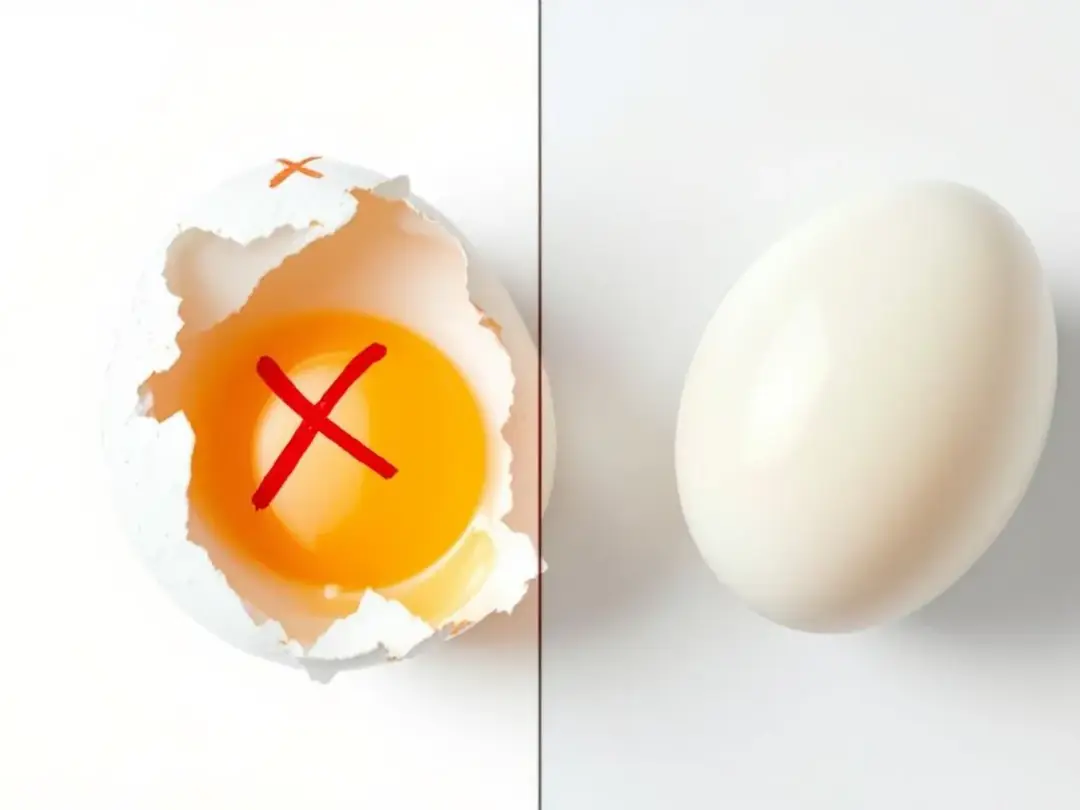Key Takeaways
-
Dogs can safely eat cooked eggs as an occasional treat, providing high-quality protein and essential nutrients
-
Always feed eggs fully cooked (hard-boiled or scrambled) without oil, butter, salt, or seasonings to avoid health risks
-
Raw eggs should be avoided due to salmonella contamination risk and potential biotin deficiency
-
Limit egg portions to 1-2 eggs per week depending on your dog's size to prevent weight gain and nutritional imbalances
-
Monitor your dog for allergic reactions when introducing eggs, including vomiting, diarrhea, or skin irritation
Are Eggs Safe and Beneficial for Dogs?
Cooked eggs are not only safe but highly nutritious for most dogs when prepared correctly and fed in moderation. Eggs serve as a complete protein source, containing all essential amino acids required for optimal canine health. A single large egg provides approximately 6 grams of high-quality protein, making it an excellent supplement to your dog's diet.
The nutritional benefits extend far beyond protein content. Eggs contain vital vitamins including vitamin A for immune support and vision health, vitamin D for bone development, vitamin E as an antioxidant, and B-complex vitamins that support metabolism and nervous system function. These fat soluble vitamins work together to maintain your dog's overall health and vitality.
The fatty acids found in eggs, particularly linoleic acid, promote healthy skin and contribute to a shiny, lustrous coat. Many dog owners notice improvements in their pet's coat condition after regularly adding eggs to their dog's food regimen.
Essential minerals like calcium support bone health, phosphorus aids in energy metabolism, iron helps with oxygen transport, and zinc contributes to immune function. This combination of nutrients makes the entire egg a nutritional powerhouse for dogs when incorporated thoughtfully into a complete and balanced diet.
How to Safely Prepare Eggs for Your Dog
Proper preparation is crucial when cooking eggs for your canine companion. The safest method is hard boiling: place eggs in a pot, cover with water, bring to a rolling boil, then cook for 10-12 minutes. This ensures the internal temperature reaches 160°F, eliminating harmful bacteria while preserving nutritional benefits.
For scrambled eggs, use a non-stick pan without oil, butter, or other additives. Cook the eggs thoroughly until they're firm throughout, avoiding any runny or undercooked portions. Never add salt, pepper, garlic, onions, or other seasonings that could be harmful to your dog.
After cooking, allow the eggs to cool completely before serving. Chop hard boiled eggs into appropriate bite-sized pieces based on your dog's size to prevent choking and aid digestion. Large dogs can handle bigger pieces, while small breeds require finer chopping as part of your dog's diet of special dog eggs.
If you're not serving the cooked egg or egg shells immediately, refrigerate it at 40°F or below and use within 3-4 days. Always serve refrigerated eggs at room temperature or slightly warmed-never hot-to prevent burns to your dog's throat.
The cooking process not only eliminates safety risks but also makes the protein more digestible for your dog's system, maximizing the nutritional benefit of this healthy treat.
Proper Portion Sizes and Feeding Frequency
Determining how many eggs your dog should receive depends primarily on their size and overall caloric needs. Small dogs under 25 pounds should receive no more than one egg per week, while medium dogs weighing 25-50 pounds can safely enjoy 1-2 eggs weekly. Large dogs over 50 pounds may have up to two eggs per week without exceeding appropriate calorie limits.
Consider that one large egg contains approximately 60-70 calories. For a 30-pound dog requiring roughly 800 calories daily, a single egg represents nearly 10% of their daily caloric intake. This significant contribution means eggs should supplement, not replace, your dog's regular meals.
| Dog Size | Weight Range | Maximum Eggs Per Week | Calorie Consideration |
|---|---|---|---|
| Small | Under 25 lbs | 1 egg | Monitor for weight gain |
| Medium | 25-50 lbs | 1-2 eggs | Adjust other treats accordingly |
| Large | Over 50 lbs | Up to 2 eggs | Consider activity level |
| When adding eggs to your dog's diet, reduce other treats proportionally to maintain caloric balance. This prevents unwanted weight gain while ensuring your dog continues receiving proper nutrition from their primary dog food. |
Start with smaller portions when introducing eggs for the first time, monitoring your dog's response over 24-48 hours before establishing a regular feeding schedule.


Why Raw Eggs Are Dangerous for Dogs
Despite some misconceptions about "natural" feeding, dogs should never eat raw eggs due to serious health risks. Raw or undercooked eggs can harbor dangerous bacteria including Salmonella and E. coli, which cause severe gastrointestinal infections in dogs.
Salmonella risk is particularly concerning because even clean, fresh eggs can contain bacteria internally, not just on the shell surface. Dogs consuming contaminated raw eggs may develop symptoms including vomiting, diarrhea, fever, and lethargy within 6-72 hours of consumption.
Raw egg whites contain avidin, a protein that binds to biotin (vitamin B7) and prevents its absorption. While occasional dogs eat eggshells consumption won't immediately cause biotin deficiency, regular feeding of raw egg whites over time can lead to nutritional imbalances affecting your dog's skin, coat, and overall health.
The Centers for Disease Control (CDC) specifically recommends against feeding raw eggs to pets due to these documented health risks. If your dog accidentally consumes raw eggs, monitor closely for symptoms and contact your local veterinarian if any concerning signs develop.
Cooking eggs eliminates both the bacterial contamination risk and the avidin problem, making cooked eggs a safe, nutritious option while raw for should dogs eat eggs truly comes to light because of how they are cooked as eggs remain unnecessarily dangerous.
Recognizing and Managing Egg Allergies in Dogs
While egg allergies in dogs are relatively uncommon, they do occur and require careful attention. Common allergic reaction symptoms include hives, facial swelling, persistent vomiting, diarrhea, and in severe cases, difficulty breathing requiring immediate medical attention.
Skin reactions often manifest around the ears, paws, and belly areas as redness, itching, or swelling. Some dogs may develop digestive upset if the dogs eat eggs or works your dogs eat raw eggs even without visible skin symptoms, making monitoring crucial when introducing any new food.
When first offering eggs to your dog, start with a small amount-perhaps one-quarter of a cooked egg-and observe your pet carefully for 24-48 hours. Look for any changes in behavior, appetite, bowel movements, or skin condition during this monitoring period.
If you notice any concerning symptoms, discontinue eggs immediately and consult your veterinarian. Mild reactions may resolve on their own, but severe symptoms like difficulty breathing, extensive swelling, or persistent vomiting require prompt veterinary care.
For dogs with confirmed egg allergies, numerous alternative protein sources exist, including lean meats, fish, and commercially available hypoallergenic treats specifically formulated for sensitive dogs.


Special Considerations for Puppies and Senior Dogs
Puppies eat eggs differently than adult dogs due to their developing digestive systems and specific nutritional needs. Puppies under 8 weeks old should not receive if other have dog raw eggs, in the house as treats since their systems aren't mature enough to handle this additional protein source safely.
After 8 weeks, puppies can enjoy small portions of fully cooked eggs, but serving sizes should be proportionally smaller than adult recommendations. A puppy weighing 10 pounds might receive one-quarter of a cooked egg weekly, adjusting portions as they grow.
Senior dogs often benefit from eggs as an easily digestible protein source, especially if they're experiencing appetite changes or difficulty chewing harder foods. The high-quality protein supports muscle growth and maintenance, which becomes increasingly important as dogs age.
Dogs with pre existing health conditions require special consideration. Those with pancreatitis should avoid egg yolks due to their high fat content, though egg whites may be acceptable under veterinary guidance. Diabetic dogs need careful calorie monitoring when eggs are added to their feeding routine.
Always consult your veterinarian before introducing eggs to puppies, senior dogs, or any dog with chronic health conditions to ensure this addition supports rather than compromises their specific nutritional needs.
Eggshells: Benefits and Risks
Some dog owners wonder whether dogs eat eggshells safely and whether they provide additional benefits. Eggshells do contain more calcium than the egg contents, potentially supporting bone health, but they also present significant risks that outweigh potential benefits.
Sharp eggshell fragments pose choking hazards and can damage your dog's throat, mouth, or digestive tract. Even small pieces can cause irritation or injury, making whole or large eggshell pieces inappropriate for canine consumption.
If considering eggshells for calcium supplementation, they must be thoroughly cleaned, completely dried, and ground into a fine powder to eliminate sharp edges. However, this process is labor-intensive and still carries risks if not done properly.
Safer calcium supplement alternatives exist, including commercially available products specifically formulated for dogs. These provide controlled calcium amounts without the safety risks associated with crushed eggshells.
Before adding any calcium supplements to your dog's diet, consult your veterinarian to determine if additional calcium is necessary and what appropriate amount would benefit your specific dog without causing nutritional imbalances.


Types of Eggs and Preparation Methods
While chicken eggs are most commonly fed to dogs, other egg types like duck and quail eggs are also safe when cooked properly. Free range farm hens typically produce eggs with higher omega-3 fatty acid content compared to conventional eggs, potentially offering enhanced health benefits for your dog's skin and coat.
Regardless of the egg source, the same safety rules apply: always cook eggs thoroughly and avoid any seasonings or additives. Duck eggs are larger and contain more calories, so adjust portions accordingly to prevent overfeeding.
Avoid feeding pickled eggs, deviled eggs, or any seasoned egg preparations, as these contain ingredients harmful to dogs. Fried eggs cooked in oil or butter add unnecessary fats and calories, while Scotch eggs or other breaded preparations contain too many other additives for safe canine consumption.
When selecting eggs, choose fresh products from reputable sources and check expiration dates carefully. Never feed expired or spoiled eggs to your dog, regardless of how they're prepared.
Hard boiled eggs and plain scrambled eggs remain the safest preparation methods, providing maximum nutritional value while minimizing health risks.
When to Consult Your Veterinarian
Several situations warrant professional veterinary consultation before feeding eggs to your dog. Dogs with known food allergies require careful evaluation, as egg allergies can develop even in dogs who previously tolerated eggs without problems.
If your dog experiences persistent digestive upset, skin reactions, or behavioral changes after eating eggs, discontinue feeding them and schedule a veterinary appointment. What appears to be a minor reaction could indicate a developing allergy or underlying health issue.
Dogs with chronic conditions like pancreatitis, diabetes, kidney disease, or obesity need individualized dietary guidance. Your veterinarian can determine whether eggs fit appropriately into your dog's specific nutritional plan and health management strategy.
If your dog accidentally consumes raw eggs or a large quantity of cooked eggs, contact your veterinarian for guidance on monitoring and potential treatment needs.
Regular check-ups provide opportunities to discuss your dog's overall diet, including treats and supplements like eggs, ensuring all dietary choices support your pet's long-term health and wellness goals.
FAQ
Can dogs eat eggs every day?
No, dogs should not eat eggs daily. Limit egg consumption to 1-2 eggs per week depending on your dog's size to prevent nutritional imbalances and avoid excessive calories that could lead to weight gain.
What should I do if my dog ate a whole carton of raw eggs?
Contact your veterinarian immediately if your dog consumed multiple raw eggs. Monitor for symptoms of salmonella poisoning including vomiting, diarrhea, lethargy, and fever, which may appear within 6-72 hours of consumption.
Are organic or free-range eggs better for dogs?
Yes, free-range and organic eggs typically contain higher levels of omega-3 fatty acids and vitamins compared to conventional eggs, potentially providing enhanced nutritional benefits for your dog's health.
Can I give my dog just egg whites to reduce fat content?
Yes, egg whites are lower in fat and calories than whole eggs, making them suitable for dogs with pancreatitis or weight management needs. However, whole eggs provide more complete nutrition when fed appropriately.
How long can I store cooked eggs for my dog?
Store cooked eggs in the refrigerator at 40°F or below and use within 3-4 days. Always serve at room temperature or slightly warmed, never hot, to prevent burns to your dog's mouth and throat.






